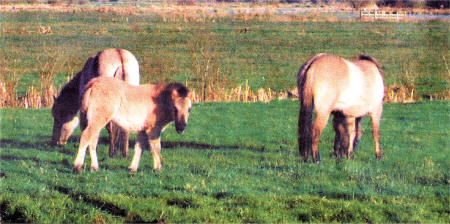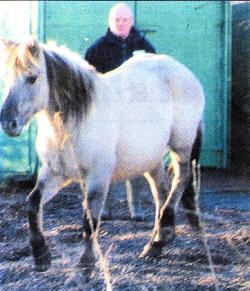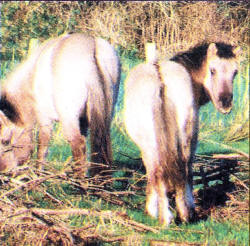 |
by STACEY HEANEY |

The Konik ponies quickly settled into their
new home at Portmore Lough Nature Reserve.
A GROUP of rare Polish ponies arrived at
Portmore Lough this week to assist an RSPB conservation
project which is currently underway.
The nine Konik ponies - a primitive Polish
breed, are believed to be the first of the breed in Ireland, and
were brought to Portmore as part of a project to enhance and
restore the wetland habitat at the nature reserve. The ponies
were released on Wednesday morning, following a long journey
from Holland which took them through Denmark, before arriving in
Northern Ireland on Tuesday night. Despite their long haul, they
quickly settled into their new home near Lisburn.
John Scovell, RSPB warden at Portmore Lough
Reserve said, "This is part of a whole regeneration scheme to
conserve the Lapwing, Snipe Curlew and Redshank. The ponies wil
help to keep down areas of scrublanc which can have a
detrimental impact on the species, especially the Lapwing.
"They are wild, hardy ponies that can survive
in conditions of minus 30 and are happy up to their tummies it
water. They were let off this morning and they have explored the
whole site, I can see them now grazing away they look superb and
not at all anxious," he said.
The koniks originated in Eastern. Europe and
were the closest living relative of the last breed of western
European wild horse, the Tarpan, which is now extinct.
 |
 |
|
The Konik ponies are released at
Portmore Lough. |
The
Konik ponies get used to their new home. |
John continued, "The ponies have all the
attributes of the Tarpan; they are the closest thing to
primitive horses there are. They will live on the edge of the
marsh, where aggressive plants grow. The ponies will eat those
aggressive plants, which will be better for the insects and
birds.
"Although the ponies are wild, they are
docile, you can walk among them and they won't bother with you.
It will take them a year to really settle; they operate as a
herd, with a stallion, a mare and foals.
"They are cautious animals, they will work
out where the drains are, where the plants are, where the wet
spots are. If they get sick they will eat plants that will cure
them, they are remarkable. They rarely get sick but we will have
a vet check them once a year to check their health and their
feet; though they will have little human contact."
John continued, "This was made possible by
Biffaward landfill community fund, who award grants for
conservation projects each year. We received funding for
specialist vehicles as well as for habitat management, which
includes this project and a small shelter for bird watching."
Portmore Lough Nature Reserve is the perfect
place for families in the spring and summer, with a place for a
picnic as well as plenty of nature spotting, including many
birds, butterflies and wildflowers.
John said, "Anyone can come and enjoy the area, although if
they come in the winter they should bring wellington boots,
however it is a fun day for all the family."
Ulster Star
01/02/2008
 |